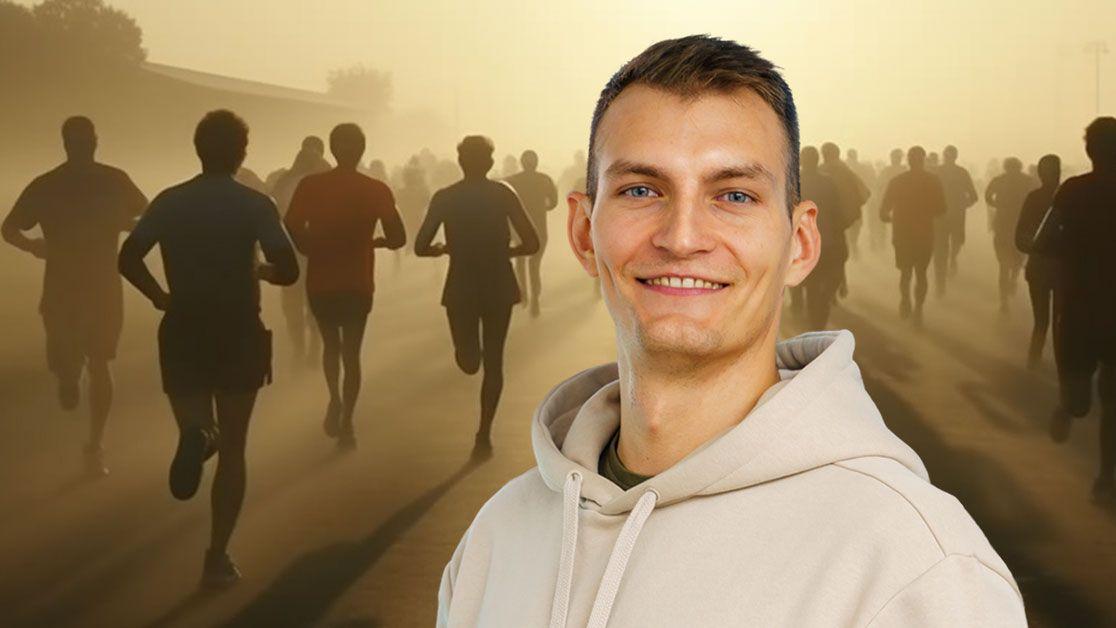
On constantly raising the bar
We’ve never been known to beat around the bush here at Insights. Getting straight to the crux of the matter, our guest on this month’s MakoTalks podcast came to us and suggested being interviewed. So we’re not taking any of the credit for turning the spotlight on the topic he brought to us. He himself admits that he’s been involved in sport since his childhood, but keeps switching disciplines. What he says makes it simple to deduce that he likes change, the development that goes hand in hand with it and, most certainly, setting himself new challenges. Who, then, is our guest for the October MakoTalks podcast? Insights is pleased to present front-end developer Adam Pietkiewicz. Read on to find out about how he made the decision to run in no less than twelve marathons!
As you’ve said, you’ve been involved in sport since you were a child, but you only started long-distance running at the beginning of this year. What impelled you to do that?
As far as sport’s concerned, when I was about seven, I took up swimming and did that for eight years. Then I switched to the gym and tried out all sorts of things, like basketball and squash. In general, everyone jokes that I’m always thinking up new stuff to do. Last year was a bit of a tough one for me and I needed some kind of challenge for my own sake. And that’s how I ended up running. I’d moved to Warsaw and I saw that the Warsaw half marathon was happening two days after my twenty-sixth birthday. That was the challenge that appeared in front of me and I knew at once... that was it!
Did you have to do anything special by way of preparing to run that first half marathon?
I’d never been a runner, so I didn’t know how to tackle it. When I went running for the first time, on 2nd January, two kilometres round the residential estate left me completely breathless. I’d always though that anyone who runs a marathon or half marathon must be pounding out those forty kilometres every day, so that first run was terrifying. But there were ready-to-use training schedules on the half marathon website and it turned out that two to three kilometres is enough, especially if you’re a beginner. The schedule was designed for twelve weeks. I checked the calendar... and there were exactly twelve weeks to go before the half marathon. Brilliant!
I wanted to do it in under two hours. That meant running a kilometre at a speed of five minutes, thirty seconds. And I succeeded! I did it in an hour and fifty-eight minutes. I managed it by following the schedule from the website, though I think I could have prepared for it even better. I trained around three times a week. The half-marathon is twenty-one kilometres and you quite quickly reach the point where five to ten kilometres becomes such a pleasure that you switch over to autopilot and your mind roams free. It happened sooner than I’d thought it would, given that I’d never been one for running. Most people say that they hate running.
Are you pleased with your first efforts?
As I said, I could have done better. Things can always be better. But I’ve talked to people who are more experienced than I am and they said the timing and results I’ve clocked up are good. I did the full marathon in three hours, fifty-seven minutes. I wanted to crack it in four hours and I succeeded. So I’ve achieved both my goals. Several thousand people run in marathons, so there’s no sense in battling against others. Just set yourself a goal and do what you set out to do.
So what gave you the idea of entering another twelve marathons?
Once the bug’s bitten, you’re quick to look for the next challenge! The half marathon was the challenge I wanted to meet after last year. It partly unlocked something in my mind and then I had the feeling that running marathons was what I wanted to do and that it was going to surprise me in the way I’d intended right from the start. A month after the half marathon, I put my name down for the Warsaw marathon.
Once you’ve achieved one goal you’ve set yourself and then achieved the next one, you get a kind of blank space in your mind. Now what? Two days later, my legs were still hurting, but the thought of going on was already smouldering in my mind. I didn’t want to carry on running without a plan. You do spend a long time running and you need motivation.
Three weeks after the marathon, I had a plan A and a plan B, a low-budget plan and a high-budget one. And I had an idea of how it might shape up. I’ve set up an account on TikTok and on Instagram, but I’m only publishing them today, so a lot of my friends don’t even know yet that anything’s happening. Every day, new ideas about how to promote my marathon-running project, how to attract some attention to it, pop into my head. And I’m really psyched up.
In terms of the countries, that’s seriously going to depend on the budget. Right now, I’ve registered and paid for Seville on 18th February and Barcelona on 10th March. Paris and Vienna are next on the list. With some of the cities, I’ve already talked to friends about accommodation, so as to get a handle on the logistics, as well. Marathons always happen at weekends, so that simplifies things a lot. The marathons on the high-budget plan are all taking place in different European countries. If the budget won’t stretch to it, then there are five marathons in Poland, so I’ll do some of them here. One way or another, I’m planning to run twelve!

What’s your primary goal?
Selfishly, I certainly want to prove to myself that I can do it, because it’s a major thing in comparison to where I was a year ago. Apart from that, though. I’ve noticed how the fact that I’m doing something like this is even motivating my closest friends. So if, at the same time, the whole initiative leads to me motivating more people through social media and through what I want to do and what I have planned, then that would be awesome! And there’s nothing to say that all twelve marathons have to be organised races. Perhaps I’ll succeed in organising something myself. Not necessarily a marathon, but maybe a gathering of people who’d like to run those forty-two kilometres together.
What does running do for you?
A marathon unlocked something I hadn’t even been aware of in my mind. And if that’s how I felt after one, how am I going to feel after twelve? People may laugh at this, of course, but I’ve given meditation a go in my time. I’ve simply sat down for ten minutes, turned on a timer so as not to end up concerned about the time and tried not to think about anything at all. It was brilliant because it actually worked. If my concentration was flagging at two o’clock, then, after ten minutes of mediation, my focus was excellent for the next two hours. And running is like that, only it lasts longer as a rule and you can really reset your mind. In other words, we do something that develops us physically and give our minds a break at the same time.
Is it sport for everyone?
I think that anyone would be capable of doing a marathon or half marathon, even from one day to the next. It would certainly be a very slow one, but the upper limit for finishing is six hours. So, if an average person can head up into the mountains and hike thirty to forty kilometres there in one day, then they’d also be capable of doing a very slow, forty-two-kilometre marathon. We’re genetically predisposed to it. Not everyone is mentally, for sure, but physiologically speaking, certainly.
It might not be a sport for everyone from the get-go, because if someone’s spent the last twenty years sitting in front of a computer, they should start more from looking after themselves properly and checking whether it would actually be good for them. Or start by going for walks. But if someone’s capable of starting with two or three kilometres, they’ll get to five and then six really quickly... and sometimes it becomes a great form of meditation.
How would you encourage people who are more resistant to give running a go?
It’d be great of someone’s inspired by what I’m doing, because the fact is that most people don’t like running. I was that person, too. If you’d said to me a year ago that I’d be running twelve marathons, I’d have laughed out loud, for sure. But if you’re systematic about it for a while, then you’ll quickly reach the point where running ten kilometres is like meditating. Really. Your legs carry you along and your mind’s floating somewhere else.
That’s also why I like taking on new things, because the progress is fast. You can feel it happening from one training session to the next. Later on, it slows down, it’s less noticeable. But then you can always look back to where you were earlier. Back to the time when you were completely breathless after two kilometres round a residential estate... and then, just a couple of months later, you’re running a marathon. Of course, as I said, it’s worth checking out what will be healthiest for you and turning to a trainer for help when you start. I realised myself how many mistakes I made at the beginning. It seems straightforward, but you can damage your knees and hips if you go about it the wrong way.
Around thirteen thousand people ran the Warsaw marathon. In the biggest marathons, you get several tens of thousands of people running at the same time. You’re training is all on your own or with a group of friends, so you only realise just how many people there are when you’re at the event itself. Everyone there is overcoming their limitations. For me, the going got really tough after thirty kilometres. My legs simply didn’t want to know.
Everyone has their own story. One person might have been ill. Someone might have been overweight all their life and has set themselves this goal. Maybe someone has made someone else a promise. And as you reach the finishing line, you’ll see so many people there crying. I had tears in my eyes and I was smiling all at once. It’s the most extraordinary endorphin rush.
In general, the finishing line is a fascinating place and I recommend being there. It’s where thousands of people are crying with happiness, Something like a festival of people who are sober and happy, brimming with endorphins and without so much as a hint of substances. Everyone’s congratulating everyone else. It’s something I’d recommend everyone tries once in their life. If running can teach us anything, it’s that the reward for the hours devoted to the goal is more than worth it.
Here at Insights, we’re all keeping our fingers crossed for the success of Adam’s initiative. May he run all twelve, high-budget marathons in different countries across Europe! We hope that our podcast and this transcript of it will contribute by spreading the word about running. And we also hope that Adam succeeds in attracting a throng of people to his initiative, that they will join him and that, together, they can be a living example of what can be done and is worth doing.
Translated from the Polish by Cary Swift

Kamila Braszak
Employer Branding Specialist




